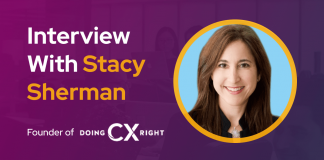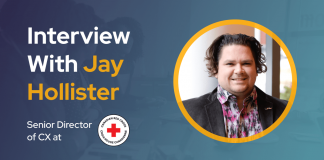Hi David, tell us about yourself and your background.
Born in Summit, N.J., I grew up mainly in Australia and was educated at Melbourne University. I moved back to Manhattan in 1992 with an idea for combining video and audio with magazine-style articles and photos as a pop-culture digital publication on CD-ROM. Blender Magazine secured funding in 1993, launched in 1994, and was a critical success but a financial disaster. Fortunately, our work on pioneering digital advertising units for Blender led to the formation of one of New York’s first digital agencies, Dennis Interactive, where I had an initial role as the Technology lead and later as General Manager. Within that agency, we pioneered many early UX best practices and delivered a slew of innovative, award-winning client solutions. Since 2003, when the Dot Com Bust killed that company, I’ve held senior roles at both independent and holding company agencies, gradually migrating from purely digital production to experience-focused roles in the healthcare space. I’m currently SVP, Director of Customer Experience for Biolumina, a healthcare agency that works exclusively in the oncology space.
What is the biggest misunderstanding about customer experience, in your opinion?
The biggest misunderstanding about customer experience is a belief that the overall experience can be fixed by iterating on isolated aspects of our interactions with customers, rather than holistically evaluating and validating every brand interaction, in every channel, from initial contact to post-sales support.
What are some of the newer CX companies/solutions you’re keeping your eyes on right now?
In general, we tend to focus on observed user behavior and hard data, rather than a survey or attitudinal inputs when evaluating pain points along the user journey. In healthcare in the US, we have the benefit of working within an industry and environment where almost every aspect of our customer’s activity – and their customer’s reaction – is documented and measured: every (anonymized) patient visit, every prescription is written, every refill, every utilization of support services and financial aid is documented, and can be mapped back to provide ROI on brand interactions. With this wealth of data comes complexity, and we are working with multiple clients to utilize machine learning to uncover insights within these large datasets, both to optimize targeting, messaging, and channels, and to measure overall impact. That’s our big focus. In addition, off the shelf, we’re using tools like MouseFlow to observe user activity on our client websites, look at Google Analytics every day, and are increasingly relying on tools like Mural, Miro, Groupmap, and Teams for successful collaboration and execution in the virtual environment.
What can companies do to improve customer loyalty and retention?
As high-level principles, we focus on simplicity, relevance, and utility as key virtues in any brand communication. Is it clear why we are talking to you, and what we are saying? Is what we are saying something you are interested in hearing? Is it making your life easier/better? In 2021, the importance of empathy in customer interaction, measured against these principles, cannot be overstated.
What do you think is most relevant and why: CSAT (customer satisfaction score), NPS (net promoter score), or CES (customer effort score)?
In healthcare marketing, we are fortunate to have access to full prescribing histories and other objective, target-universe-spanning data – with similar richness to the closed-system data available to companies like Apple or Netflix. Because of this robust data, tied directly to ROI, as well as a wealth of leading-indicator data from media and site analytics, we are not reliant on a survey- or social-media-based metrics like CSAT, NPS, or CES.
How can companies better use social media in the era of customer-centricity and personalization?
Social media platforms offer unique targeting capabilities, which healthcare marketing – both professional and patient – has been using effectively in the US for many years. However, as a highly regulated industry, we are extremely limited in our use of influencer marketing and other testimonial media, which is where the highest impact is felt in social media, in my experience. Within branded communications on social media, the requirement that all promotional messaging be pre-approved by medical, legal, and regulatory bodies within our clients (a multi-week process) limits our ability to be spontaneous/responsive to current events, use humor, or to shock. I suspect it will be some time before a pharma ad goes “viral” on social media (at least in a good way).
7. What is your opinion on AI-based chatbots to handle customer support?
We find chatbots a useful way of handling initial inquiries, but the key to their utility is the handoff to a live operator when the interaction gets complex or deeper information is requested. In healthcare marketing, particularly in discussing oncology products with doctors and patients, we have found that the complexity of the subject and the rapidity of information change (new data from clinical trials, new competitors in the marketplace, complexity around biomarkers, and other indicators) make programming and teaching chatbots to fully handle product inquiries are both inefficient and unsatisfactory for the customers. In general, we allow chatbots to handle simple interactions (setting up an appointment to speak with a sales rep, for example, or providing a link to enrollment in a patient support program), but immediately hand off more complex questions to a live human medical professional or subject matter expert.
What was the best movie you saw that has come out during this past year?
I enjoyed many movies in 2020, notably The Trial of the Chicago 7, Borat Subsequent Moviefilm, One Night in Miami, and Soul, but the one that has stuck with me longest was Minari. My binge-watch series was The Queen’s Gambit.
Last but not least, what is your favorite CX metric?
My favorite CX metric is hard ROI






